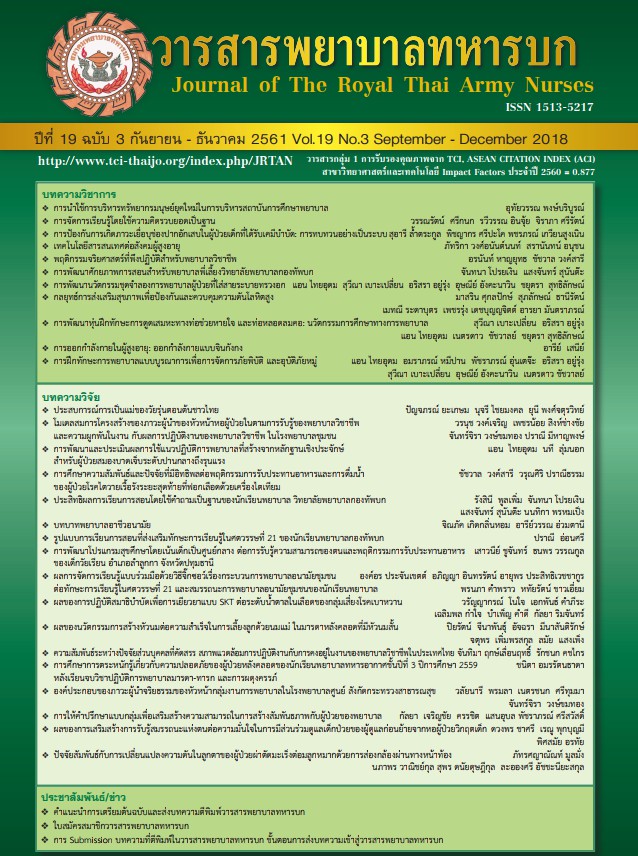The Components of Ethical Leadership of Nursing Division Head at Advanced Hospitals under Ministry of Public Health
Keywords:
Ethical Leadership, Nursing Division Head, Advanced HospitalsAbstract
The purposes of analytical research were to study the components ethical leadership among division head nurses in advanced hospitals under ministry of public health. The research samples were 314 head nurses of Cluster Random Sampling at 11 hospitals, and Proportional random sampling population. The research instruments of ethical leadership questionnaire conducted from ethical leadership concept and semi-structured interviews. The content validity test were conducted at. 84, and the reliability of the questionnaires in the form of Cronbach’s alpha coefficient was at 0.89. The data were analyzed using content analysis, exploratory factor and analysis confirmatory factor analysis. The findings of the research were as follows: there were eight components of ethical leadership among division head nurses in advanced hospitals under ministry of public health which were described by 29 observed which the value of factor loading of each components were between 0.71 – 0.89, and the variance components describes the ethical leadership at 51 – 80%. The sequence of components according to value by factor loading were as high to lease follows: (1) managing fairness (ß = 0.89), (2) integrity (ß = 0.87), (3) honesty (ß = 0.86), (4) reinforcement (ß = 0.86), (5) ethical communication (ß = 0.83), (6) responsibility (ß = 0.80), (7) friendly interpersonal relationship (ß = 0.79), and (8) caring (ß = 0.71). The finding revealed the components were significantly congruence with the empirical data. (χ2 /df = 2.55, SRMR = 0.02, RMSEA = 0.07, CFI = 0.99, TLI = 0.98). Based on the research findings, the researcher recommends observed of ethical leadership of division head nurses. The nurse administrators can emphasis on implementation as the guideline to develop tool for measuring of ethical leadership in advanced hospitals.
Downloads
References
2. Brown ME., Trevino LK. Ethical leadership: A Review and Future Directions. J Leadership. Quarterly 2006; 17: 595 – 616.
3. THAMPITAK, P. A Multilevel Structural Equation Modeling of the Causal Variable Ethical Leadership of Leaders, and their Influence on Psychological Antecedents and work Behavior Outcomes of Private Organization Employees. Doctor of Philosophy degree in Applied Behavioral Science Research at Srinakharinwirot University; 2015. (In Thai)
4. The Board of Directors develops ethics and morals. Ministry of Public Health. (Kullaya Siikoklai) Strategic Plan for the Development of Moral Ethics 2012 - 2016. Office of the Permanent Secretary for Public Health. 2012. (In Thai)
5. Office of Policy and Strategy Office of the Permanent Secretary, Ministry of Public Health. Policies & Plans Ministry of Public Health. Office of the Permanent Secretary, Ministry of Public Health Ministry of Public Health;. 2014. (In Thai)
6. Thailand Nursing and Midwifery Council. Ethical Guidelines for Nursing Organizations: Mechanisms and Practices. Bangkok: Golden Point Co., Ltd; .2015. (In Thai)
7. Thailand Nursing and Midwifery Council. Nursing Management Performance. Bangkok: Golden Point Co., Ltd; 2013. (In Thai)
8. Ponnu, C., H. Tenakoon, G. The Association between Ethical Leadership and Employee Outcomes–the Malaysian Case. Electronic Journal of Business Ethics and Organization Studies. 2009; 14(1): 21 – 32.
9. YunChoi, S.The Effects of Ethical Leadership on Social Worker’s Trust in Organization and Organizational Commitment. Advanced Science and Technology Letters,2014; 57: 23-26.
10. Makaroff, Sk., Storch, J., Pauly, B., Newton, L. Searching for ethical leadership in nursing. J Nursing Ethics. 2014; 21(6): 642 – 658.
11. Manyat S. Structural Relationships Factors Affecting Ethical Leadership of School Administrators Department of Local Administration. Dissertation of doctor,
Educational administration, Graduate School of Khonken University; 2012. (In Thai)
12. Palsarn S. Development of Ethical Leadership Indicators of School Administrators of Affiliation Office of the Basic Education Commission. Dissertation of Doctoral in Educational Administration, Graduate School of Khonkhen university; 2013. (In Thai)
13. King, M. Practical reasoning and ethical decision. Ethics. 2008; 118(4): 717-721.
14. Walainaree, P.,Netchanok, S., Janjira, W. The Behaviors of Ethical leadership of Division Head Nurses at Advanced hospital under Ministry of Public Health: A Qualitative study. Indian Journal of Public Health Research & Development. 2018; 9(10): 545-549.
15. Yukl, G., Mahsud, R., Hassan, S., and Prussia, G.E. An Improved Measure of Ethical Leadership. Journal of Leadership & Organizational Studies.2013; 20(1): 38-48.
16. Kalshoven, K., Den Hartog, D.N, De Hoogh, A. H. B. Ethical leadership at work questionnaire (ELW): Development and validation of a multidimensional measure. The Leadership Quarterly.2011; 22(1): 51-69.
17. Faculty of Engineering Kasetsart University. Published in Auspicious Occasion of HM the King’ S 80th Birthday Anniversary 5 December 2007. Bangkok: Kasetsart University Press; 2008. (In Thai)
18. Sirilai S. Ethics for Nursing. Bangkok: Chulalongkorn University; 2008. (In Thai)
19. Prichayudh, N, Oumtanee, R. The Buddhist Leadership Experiences of Head Nurses. J Nursing Science Naresuan Universit. 2007; 2(1): 52 - 65. (In Thai)
20. Harnyoot, O. Ethical Decision Making: Concept and Application. Journal of The Royal Thai Army Nurse. 2018; 19(2): 111-119. (In Thai)
Downloads
Published
How to Cite
Issue
Section
License
บทความหรือข้อคิดเห็นใดใดที่ปรากฏในวารสารพยาบาลทหารบกเป็นวรรณกรรมของผู้เขียน ซึ่งบรรณาธิการหรือสมาคมพยาบาลทหารบก ไม่จำเป็นต้องเห็นด้วย
บทความที่ได้รับการตีพิมพ์เป็นลิขสิทธิ์ของวารสารพยาบาลทหารบก
The ideas and opinions expressed in the Journal of The Royal Thai Army Nurses are those of the authors and not necessarily those
of the editor or Royal Thai Army Nurses Association.






